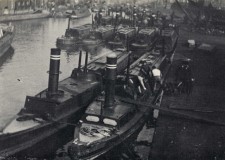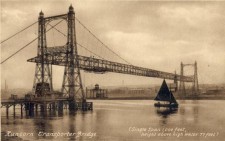-
About Us
Canal Boatmen Family History
Boatmen in the news
Newspapers -Staffordshire
More from Staffordshire
Newspapers - Warwickshire
Newspapers - Birmingham
Newspapers - Leicestershire
Newspapers - Derbyshire
Newspapers - Nottingham
Newspapers - Cheshire
More from Cheshire
Newspapers - Northants
Newspapers - Lancashire
Newspapers - Manchester
Newspapers - Liverpool
Newspapers - Yorkshire
Newspapers - Worcestershire
Newspapers - Gloucestershire
Newspapers - Shropshire
Newspapers - Oxfordshire
Newspapers - Wales
Newspapers - Essex
Newspapers - Kent
Newspapers - London
Censuses
Parish register extracts
Other useful stuff
Contacts, names and photos
Contact
Links
More newspapers from Cheshire
More from Cheshire

When William Burrows died suddenly at Grappenhall in August 1878, the Coroner's jury, in the absence of any other information, recorded that he had "died by the visitation of God".
In January 1878, John Poole was imprisoned for obstructing the traffic on the River Weaver at Weston Point by mooring his vessel in the wrong place and refusing to move it when asked.
During this time, a Boatman's Bethel was established at Chester, as a direct result of the death of Charles Mostyn, which shone the spotlight on the way in which boatmen lived.
A graphic description of a ship's boiler explosion at Saltersford Locks, dated October 1889, and which resulted in the death of engineer John Penny, is included in this selection. Penny had gone into the engine house to oil the machinery while the boat was stationary. His crew mate, George Southam, when trying to bring Penny out of the water, describes Penny's skin peeling off when he tried to get hold of his arms. Dr Smith, who treated the victim, said, "The skin peeled off his hands just the same as you take off a glove".
In 1886, 3 year old William Silas Wood, son of William Wood, boatman, was drowned. Another boatman, James Sumner, was heavily criticised by the Coroner and Jury for making no attempt to save the child. The jurors gave their fees to the parents of the deceased child, and refused to allow Sumner his witness fee.
Two articles from 1909 show what conditions were like on the river Mersey. In January 1909, two Salt Union barges, the Mountaineer and the Mary Jane, were sunk in the Mersey during a blizzard. The crew of the Mountaineer, father and son John and Herbert Blower, were both drowned, but the crew of the Mary Jane, Reuben Hough and Thomas Parry, had a miraculous escape. Their boat was adrift for four hours in a raging sea, when it struck the stage of the Seacombe ferry, allowing both men to jump ashore before the boat was smashed to smithereens.
Later that year, Walter Hough, captain of the flat Peter, was crushed between two barges as he tried to jump on board when his boat was being picked up by the steam packet Russia. The captain of the Russia left the Peter behind because he did not want to take a detour for the injured man to get treatment.
An article from September 1910 by Thomas Bowyer details the steps taken for the education of canal boat children.
In July 1913, boatman George Beech lost his temper with his horse, which refused to pull and had bitten and kicked him. George Beech was seen to beat the animal around the head with his fists and kick it repeatedly, with the result that he was fined 5s and 24s 6d costs for cruelty.

A case from March 1914, when 11 men were caught drinking in the Aston Arms on Sunday morning, defined what were considered "Bona Fide" travellers. All of the men gave as their excuse that they had been out for a country walk, and just happened to call in. The five men who lived within three miles of the pub were found guilty of drinking outside licensing hours and fined 4s 6d, and the landlord was fined £1 and £3 3s advocate's fee.
In August 1914, the ss Victoria ran into the lock gates of the large lock at Saltersford, causing between £3,000 and £4,000 damage and rendering the lock useless for a period of eight months. The Weaver Trustees tried to blame the captain, Robert Brown, but the Bench decided that the charge was not proven.
In November 1915, 50 year old Thomas Watton (referred to as "elderly" by the Coroner!) was found dead in the cabin of the flat Lloyd by his co-worker, Daniel Higgins. Cause of death was pneumonia.
In a court case of December 1915 featuring Joseph and Emma Jones and their two daughters, the rights of boatmen to the "sweepings", and, for that matter, what constituted "sweepings" when canal boats were cleaned after voyages, were under discussion. In the event, the case was dismissed, and the coal which had been collected after the boat was cleaned was returned to the Jones family..
In May 1917, the drowning of one of the lock keepers at Dutton Locks, Albert Lyon, is recorded. Lyon fell into the water when he and the Head Lock Keeper, Thomas Stubbs, were dropping one of the sluices to lower the height of the water, a procedure which required two people, one to work the clutch and the other the lever.
In September of the same year, 12 year old James Thomas Stokes died as a result of stepping on to and breaking a bottle of vitriol which was part of the cargo on his father's boat - all the more tragic because he should have been at school.
February 1916 saw an argument in court over who was liable for National Insurance Contributions for hands on barges. Was it the Company or the Captain? The Company paid the National Insurance for the Captain, Ernest Twigg, but the argument was that the Captain engaged and paid the wages of the hand, Charles Sandford. The Court's decision was that the Shropshire Union Company was liable for all National Insurance contributions.
A number of cases from 1919 discuss the notice periods which boatmen needed to give, and the custom of giving a trip's notice. Interestingly, the payments involved were £6 for a trip to Yorkshire from Runcorn, and £3 a trip to Manchester.

On the 4th of May 1878, boatman Samuel Theobald, aged 21, died suddenly, all the more tragic because he had attended the funeral of his brother, who was drowned at Preston Brook, just two days earlier.
In November 1879, the coroner reprimanded Edward Eastcourt of Rookery Cottages for not jumping into three feet of water to save his neighbour, Mary Roscoe, from drowning.
Names from Alderley and Wilmslow Advertiser 1875 to 1885 (59kb)
In March 1881, Mr Gleave of Whatcroft Hall hired Thomas Barker and Thomas Cash to fell some trees on the side of the canal on his property. The tree fellers must have been pretty inept, because they failed to tie a rope to the elm tree they were felling, and it landed on 25 year old Harriet Chatwin, who was leading a boat horse on the towing path, and killed her.
An 1885 article on the sanitary condition of Sandbach and Alsager states that deaths from consumption in the UK were 2,500 per million population in 1882, but had dropped to 1,800 per million by 1885.
Articles from Alderley and Wilmslow Advertiser 1875 to 1885 (300kb)
It was apparently commonplace for poachers to hitch a ride on any passing canal boat when they returned home from their poaching trips, and in general the boatmen were afraid to refuse. In 1887, a gang of poachers attacked and seriously injured two policemen, returning home on the Laura, with crew Thomas Evans and Thomas Hopley, who had to give evidence in court.
In July 1889, George Carter was accused of jumping on board the boat of William Ellis, and helping himself to a basket of provisions, and William's hat, which was on his head at the time!
Names from Alderley and Wilmslow Advertiser 1886 to 1899 (60kb)
In March 1898, James Clowes was accused of failing to maintain his family, and given two months' imprisonment. The Bench complimented his wife, Annie, who had done her utmost to care for the children despite her ill health and lack of money. As ever, "demon drink" was the culprit.
William Groomie, a boatman of Tunstall, had the rather alarming nickname of "Bill the Devil".
Articles from Alderley and Wilmslow Advertiser 1886 to 1899 (317kb)

